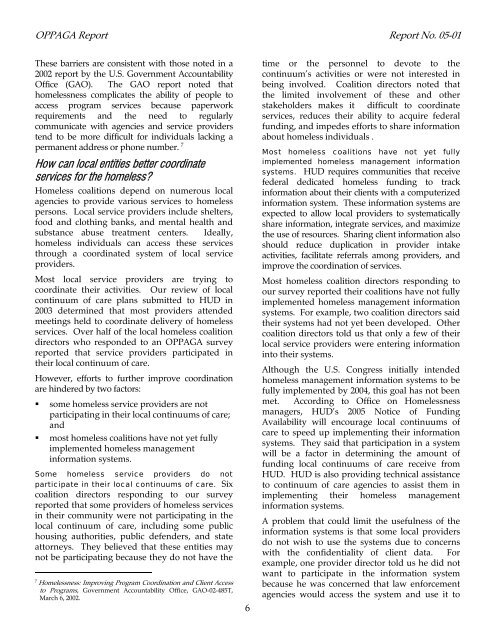The Economic Consequences of Homelessness in The US
The Economic Consequences of Homelessness in The US
The Economic Consequences of Homelessness in The US
Create successful ePaper yourself
Turn your PDF publications into a flip-book with our unique Google optimized e-Paper software.
OPPAGA Report Report No. 05-01<br />
<strong>The</strong>se barriers are consistent with those noted <strong>in</strong> a<br />
2002 report by the U.S. Government Accountability<br />
Office (GAO). <strong>The</strong> GAO report noted that<br />
homelessness complicates the ability <strong>of</strong> people to<br />
access program services because paperwork<br />
requirements and the need to regularly<br />
communicate with agencies and service providers<br />
tend to be more difficult for <strong>in</strong>dividuals lack<strong>in</strong>g a<br />
permanent address or phone number. 7<br />
How can local entities better coord<strong>in</strong>ate<br />
services for the homeless?<br />
Homeless coalitions depend on numerous local<br />
agencies to provide various services to homeless<br />
persons. Local service providers <strong>in</strong>clude shelters,<br />
food and cloth<strong>in</strong>g banks, and mental health and<br />
substance abuse treatment centers. Ideally,<br />
homeless <strong>in</strong>dividuals can access these services<br />
through a coord<strong>in</strong>ated system <strong>of</strong> local service<br />
providers.<br />
Most local service providers are try<strong>in</strong>g to<br />
coord<strong>in</strong>ate their activities. Our review <strong>of</strong> local<br />
cont<strong>in</strong>uum <strong>of</strong> care plans submitted to HUD <strong>in</strong><br />
2003 determ<strong>in</strong>ed that most providers attended<br />
meet<strong>in</strong>gs held to coord<strong>in</strong>ate delivery <strong>of</strong> homeless<br />
services. Over half <strong>of</strong> the local homeless coalition<br />
directors who responded to an OPPAGA survey<br />
reported that service providers participated <strong>in</strong><br />
their local cont<strong>in</strong>uum <strong>of</strong> care.<br />
However, efforts to further improve coord<strong>in</strong>ation<br />
are h<strong>in</strong>dered by two factors:<br />
• some homeless service providers are not<br />
participat<strong>in</strong>g <strong>in</strong> their local cont<strong>in</strong>uums <strong>of</strong> care;<br />
and<br />
• most homeless coalitions have not yet fully<br />
implemented homeless management<br />
<strong>in</strong>formation systems.<br />
Some homeless service providers do not<br />
participate <strong>in</strong> their local cont<strong>in</strong>uums <strong>of</strong> care. Six<br />
coalition directors respond<strong>in</strong>g to our survey<br />
reported that some providers <strong>of</strong> homeless services<br />
<strong>in</strong> their community were not participat<strong>in</strong>g <strong>in</strong> the<br />
local cont<strong>in</strong>uum <strong>of</strong> care, <strong>in</strong>clud<strong>in</strong>g some public<br />
hous<strong>in</strong>g authorities, public defenders, and state<br />
attorneys. <strong>The</strong>y believed that these entities may<br />
not be participat<strong>in</strong>g because they do not have the<br />
7<br />
<strong>Homelessness</strong>: Improv<strong>in</strong>g Program Coord<strong>in</strong>ation and Client Access<br />
to Programs, Government Accountability Office, GAO-02-485T,<br />
March 6, 2002.<br />
6<br />
time or the personnel to devote to the<br />
cont<strong>in</strong>uum’s activities or were not <strong>in</strong>terested <strong>in</strong><br />
be<strong>in</strong>g <strong>in</strong>volved. Coalition directors noted that<br />
the limited <strong>in</strong>volvement <strong>of</strong> these and other<br />
stakeholders makes it difficult to coord<strong>in</strong>ate<br />
services, reduces their ability to acquire federal<br />
fund<strong>in</strong>g, and impedes efforts to share <strong>in</strong>formation<br />
about homeless <strong>in</strong>dividuals .<br />
Most homeless coalitions have not yet fully<br />
implemented homeless management <strong>in</strong>formation<br />
systems. HUD requires communities that receive<br />
federal dedicated homeless fund<strong>in</strong>g to track<br />
<strong>in</strong>formation about their clients with a computerized<br />
<strong>in</strong>formation system. <strong>The</strong>se <strong>in</strong>formation systems are<br />
expected to allow local providers to systematically<br />
share <strong>in</strong>formation, <strong>in</strong>tegrate services, and maximize<br />
the use <strong>of</strong> resources. Shar<strong>in</strong>g client <strong>in</strong>formation also<br />
should reduce duplication <strong>in</strong> provider <strong>in</strong>take<br />
activities, facilitate referrals among providers, and<br />
improve the coord<strong>in</strong>ation <strong>of</strong> services.<br />
Most homeless coalition directors respond<strong>in</strong>g to<br />
our survey reported their coalitions have not fully<br />
implemented homeless management <strong>in</strong>formation<br />
systems. For example, two coalition directors said<br />
their systems had not yet been developed. Other<br />
coalition directors told us that only a few <strong>of</strong> their<br />
local service providers were enter<strong>in</strong>g <strong>in</strong>formation<br />
<strong>in</strong>to their systems.<br />
Although the U.S. Congress <strong>in</strong>itially <strong>in</strong>tended<br />
homeless management <strong>in</strong>formation systems to be<br />
fully implemented by 2004, this goal has not been<br />
met. Accord<strong>in</strong>g to Office on <strong>Homelessness</strong><br />
managers, HUD’s 2005 Notice <strong>of</strong> Fund<strong>in</strong>g<br />
Availability will encourage local cont<strong>in</strong>uums <strong>of</strong><br />
care to speed up implement<strong>in</strong>g their <strong>in</strong>formation<br />
systems. <strong>The</strong>y said that participation <strong>in</strong> a system<br />
will be a factor <strong>in</strong> determ<strong>in</strong><strong>in</strong>g the amount <strong>of</strong><br />
fund<strong>in</strong>g local cont<strong>in</strong>uums <strong>of</strong> care receive from<br />
HUD. HUD is also provid<strong>in</strong>g technical assistance<br />
to cont<strong>in</strong>uum <strong>of</strong> care agencies to assist them <strong>in</strong><br />
implement<strong>in</strong>g their homeless management<br />
<strong>in</strong>formation systems.<br />
A problem that could limit the usefulness <strong>of</strong> the<br />
<strong>in</strong>formation systems is that some local providers<br />
do not wish to use the systems due to concerns<br />
with the confidentiality <strong>of</strong> client data. For<br />
example, one provider director told us he did not<br />
want to participate <strong>in</strong> the <strong>in</strong>formation system<br />
because he was concerned that law enforcement<br />
agencies would access the system and use it to

















